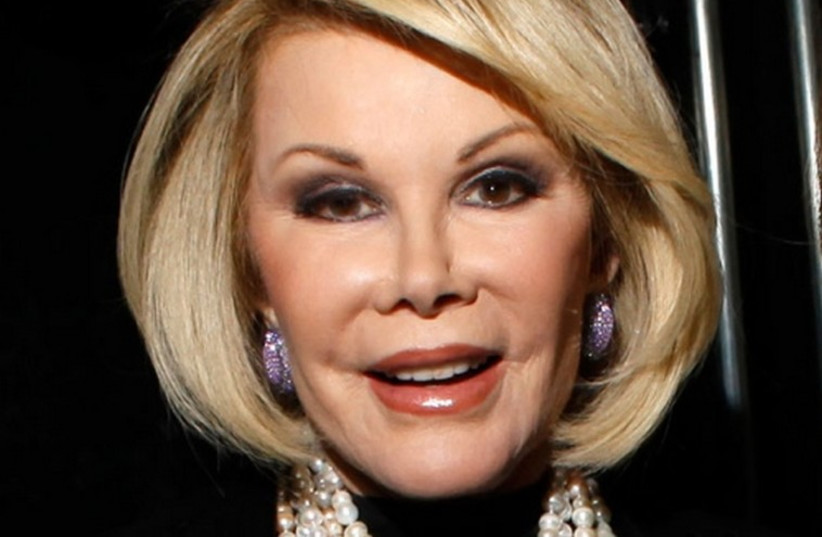Standing in line waiting to buy fresh egg rolls at a stand in Mahaneh Yehuda, I noticed near my feet a number of bags containing bread and rolls. My knee-jerk reaction: These are bombs. I was stopped in my tracks when a man came over and bent down to pick them up. “Do you want a bag of rolls?” he asked. I realized that he thought I was a poor elderly man looking with yearning at his purchases.
“I appreciate it, thanks; I’ll take a roll,” I said.
Such kindness. I not only appreciated what he had done, but I thought, in the midst of war and our anguish, that this man really cared.
I hope that, in the upcoming year of 2024, we will practice more acts like his and bring a “nice new feeling” to all of us.
2024: A new feeling for a new year
One of the comedians I used to watch in the US before making aliyah was Joan Rivers. Her humor made me laugh because it came from the heart and entered our hearts as we laughed aloud.

She once said, “Listen, I wish that I could tell you it gets better. But it doesn’t get better; you get better.”
How true that is! As we mature and face challenges in family, work, and health, we grow and develop the ability to deal with whatever life brings us.
Is that possible when so many have died and the hostage situation is so heartbreaking? Does each loss, documented in picture after picture, strike us as we pray for all our soldiers to return home safely?
Let’s listen to what a few people have to say.
Rabbi Bernard Raskas once wrote the following:
“Every time a new year arrives, we need to evaluate ourselves. Have we really filled our days with loving deeds to make our existence meaningful? Have we given our family the deep affection they need?”
Here in Israel, day after day, we have the opportunity to listen to family members praying for the return of loved ones held captive in Gaza. Their words are heartbreaking.
During COVID-19, when we were confined to our homes, two different birds would visit me. One was a tiny sparrow, and the other was a parrot, set free by its owner. The sparrow has since returned, bouncing around on my window sill. I put out food and water every day. Rarely does he take it, but once in a while he sneaks a crumb or two before he flies away.
As I am not an ornithologist or a bird watcher, I was very surprised by the parrot’s frequent, ongoing visits. I imagined him saying, “David, as you are now free, don’t fail to go outside regularly. I enjoy flying, but to really feel alive, as you take each breath, think how wonderful this world is.”
WHAT ARE we planning to do in the upcoming year to deal with the anguish that so many feel? Again and again, the families of the hostages protest against the government. Maybe their message will get through.
Each of us needs to ask ourselves: What can one person do? What can I do to influence our leaders so that they will work even harder to demonstrate that they really care? Should I be stymied by constantly questioning myself? Am I just a drop in the bucket?
Albert Schweitzer, a towering figure who fashioned important aspects of the moral tone of humanity during his lifetime, had this to say about the drop in the bucket: “We see no power in a drop of water; but let it get into a crack in the rock and be turned to ice, and then it splits the rock. Turned into steam, that drop, along with other drops, drive the pistons of the most powerful engines.”
I have a great-granddaughter now, which is a real blessing for an elder like me. Thinking frequently about how she will grow up, I recall what my mother, Anna, whose knowledge of human nature was very impressive, said. She had this mantra that she often told me and others: “I realized, as I worked in various businesses, beginning at age 15, that it takes great force to alter metal. Gold has to be beaten into shape. Iron will only respond to tremendous heat. A flower will respond to delicate outside forces.”
Then she would say, “David, always remember as you go through life that a child is the most sensitive of all. A child will respond to a thousand outside forces which neither metal nor a flower will ever feel. When you and Rita have your children, let your deeds influence their book of life.”
This past year has been one of the worst in the history of this country, with the brutal murders of over a thousand innocent civilians and the violent kidnapping of hundreds more into Gaza. Our sadness is overwhelming and will remain until all of the hostages have been released.
During my regular activities, I am constantly reminded how Israelis are filled with a desire to help, not harm – something that motivates me in these critical times. One example of this is my daily bus ride. The bus halts to let me get on. The person in the front seat moves over so I can sit down with my cane. Another person sitting across from me takes my card and makes sure my ride is authenticated. As I alight, I notice the driver has brought the bus close to the curb.
While these acts of kindness will not win the war, the goodwill makes everyone feel more positive and demonstrates how much we can do for each other.
In the new year, we must be more considerate and resolve to rebuild what has been destroyed, thereby helping to heal the wounds both physical and mental.
Sending my love to my granddaughter Romi Geffen of Beit Herut, who is celebrating her bat mitzvah. ❖
